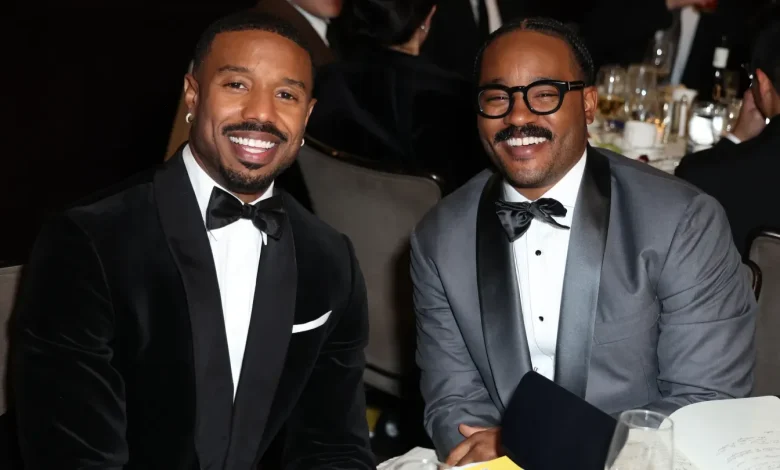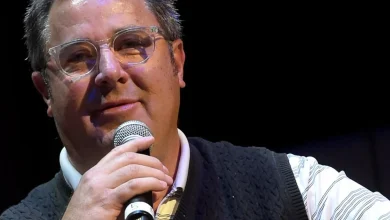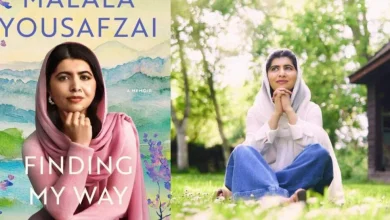Michael B. Jordan Looks Back at Early Career When He Questioned if He Was a Leading Man, Credits Ryan Coogler for “Changing Everything for Me”

Michael B. Jordan was honored at the American Cinematheque Awards in Beverly Hills on Thursday, as the star reflected on the 20-year career that led him to critical and commercial success with Sinners.
The A-list came out strong to support Jordan at the event, with Ben Affleck, Mahershala Ali, Bradley Cooper, Daniel Kaluuya, Delroy Lindo, Phylicia Rashad, Octavia Spencer, Tessa Thompson and Irwin Winkler all presenting, along with video messages from Angela Bassett and Tom Cruise — the latter who declared, “When I’ve been watching your career grow over these many years, I admire your talent, your dedication, your constant willingness to learn and push the boundaries of storytelling.”
The evening kicked off with Miles Caton, Ludwig Göransson and Raphael Saadiq performing Sinners’ breakout song “I Lied to You” on stage, followed by Affleck recalling how he asked to meet with Jordan after seeing him in 2013’s Fruitvale Station and knowing “this guy is a huge movie star.”
Affleck said he was ready to give advice and be some kind of support system for the newcomer, but as the two had conversations over the years, “Mike turned out to need very little in the way of help or advice, and what it afforded me, to be honest, was just a front row seat to a young man with enormous talent and even more impressive, tremendous character and integrity,” the Good Will Hunting star continued. “I got to watch him navigate this world with grace and calm, and it’s been one of the great joys of my career.”
Throughout the evening, as clips were shown from the star’s large body of work, Thompson teased that she and Jordan playing a couple over three Creed movies “is to date the longest relationship that either of us has ever been in. That’s showbiz baby!” while Cooper acknowledged he had never worked with Jordan in any capacity but “I am simply just a dedicated fan who now, miraculously, I’ve been leveled up to friend.”
In reflecting on Black Panther, Kaluuya — who began by asking for a moment of silence for the late Chadwick Boseman — recalled how Jordan would be among the first on set, arriving early in the morning for his extensive makeup to be applied without complaint. “I used to see an early wake-up call as taking something from me, but now I see it as an opportunity to show how much I care, like Mike,” the actor said, adding, “Michael B. Jordan is a movie star, and while his star continues to rise, he keeps showing us he’s an artist as well — using his star power not to preserve what he has, but to take more creative risks.”
The presentation of the American Cinematheque honor came from Jordan’s longtime collaborator and Sinners director Ryan Coogler, who jokingly grumbled that all of the actors had said “all this shit I wrote already.” The two have worked on five films together, but Coogler recalled their first meeting at a Starbucks in Burbank, when he was pitching Jordan on Fruitvale Station.
The filmmaker had asked Jordan what his next few years of work looked like and if he would be available for the project. “He said, ‘TV show, I’ve been buying books and getting the rights to things, I can see myself doing this, that and the third.’ And I remember thinking in my head, ‘I don’t think this guy knows who he is. I don’t think he knows how how big he is,’” Coogler told the room. “I said, I’m gonna just take a risk right now and I said, ‘Hey, man, I think you’re a star. Let’s do this project together and show the world.’ And this dude looked back at me and like it was the first time somebody told him that,” as Jordan yelled out from the crowd, “It was!”
Coogler continued, “I just want to say thank you, bro, for always trusting me. All the crazy ideas, all the crazy notes; I want to apologize for putting you in all that blood, for having you get punched on camera, for everything I’ve done wrong to you. I hope you forgive you, I hope you continue to trust me.”
Daniel Kaluuya, Michael B. Jordan and Ryan Coogler
Joe Scarnici/Getty Images for American Cinematheque
Jordan, who had been wiping away tears for much of Coogler’s speech, took the stage and admitted, “Man, nobody warns you how crazy this is, to see your whole career flash before your eyes” and watching his past work “it’s inspiring, because now I want to go do something else, like what’s next?”
After thanking his family, his team and his past collaborators, Jordan remembered getting his big break on The Wire at 15 years old, and “those 13 episodes planted something in me and started a lifelong drive; 20 years later, that drive brought me to Sinners. But between The Wire and Sinners, there’s been a lot of years — procedurals, soaps, waiting for the phone to ring, and I’m grateful for all of it. I was hungry for more, curious about my limits: who could I be? Was I a leading man? Did I have what it takes? These were all questions and doubts and things a young actor has. I didn’t have those answers yet.”
He then met Coogler, who Jordan said “answered the questions that I was asking myself. Finding a collaborator like him early in my career changed everything for me. I’m very fortunate to have him and our creative partnership. Words can’t describe the impact you had on me and my life.” He joked that Coogler is only a few years older but has always been “way more mature,” and is the “main reason why I decided to direct — he kind of forced me out of the house and was like, ‘Hey, bro, it’s time for you to get behind the camera and direct this one.’ And thank you for giving me that encouragement. I don’t know if I could have done it without you.”
Looking back on their years of collaborations, Jordan concluded, “We took risks. We said our stories deserve to be told and people overwhelmingly responded. Kids saw themselves on screens in ways they hadn’t, and that was the whole point.”
Also at the event, Donna Langley presented the Power of Cinema Award to the Motion Picture Association’s chairman and CEO Charles H. Rivkin, and Jason Reitman made an appearance to advocate for contributions to the American Cinematheque’s filmmaker-supported effort to preserve the Westwood Village Theater.



![[CZEKA] To nie przypadek, że mikołajki obchodzimy 6 grudnia. Ważna rocznica](https://cdn1.emegypt.net/wp-content/uploads/2025/12/CZEKA-To-nie-przypadek-ze-mikolajki-obchodzimy-6-grudnia-Wazna-390x220.webp)

